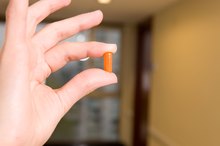Losing Weight & Hormone Replacement
As a woman ages, her body produces fewer female hormones required for reproduction and menstruation ceases. Menopause causes an array of emotional and physical symptoms. Many women survive the negative effects of menopause with the help of hormone therapy -- also known as hormone replacement therapy. Although hormone therapy can cause temporary weight gain, permanent changes in body fat distribution should be attributed to the menopause process. Losing weight can be more difficult during and after menopause, with or without hormone replacement.
Hormone Therapy
Hormone therapy eases such symptoms of menopause as hot flashes, dry skin, sleeplessness, vaginal dryness and bladder problems; it also reduces the chances of osteoporosis. Your doctor may prescribe estrogen or an estrogen-progesterone combination therapy as a pill, ointment, skin patch or vaginal gel.
Hormone Therapy and Weight Gain
Menopause & Eczema
Learn More
Hormone therapy does not cause weight gain, according to the Cleveland Clinic's website 1. You may feel bloated while taking hormones -- water retention is a side effect of estrogen therapy that usually dissipates with extended use. An adjustment to your estrogen dosage might eliminate water weight build-up.
Hormone therapy does not stop menopause -- defined on the Mayo Clinic website as the "one-year anniversary of your final period." Mayo Clinic staff explain that hormone treatments "focus on relieving your signs and symptoms and on preventing or lessening chronic conditions that may occur with aging." Increased abdominal fat is a sign of menopause that can appear long before menopause occurs and hormone therapy is prescribed. This extra fat around your midsection may cause you to feel as if you have gained weight when, in fact, your muscle mass has changed.
- Hormone therapy does not cause weight gain, according to the Cleveland Clinic's website 1.
- You may feel bloated while taking hormones -- water retention is a side effect of estrogen therapy that usually dissipates with extended use.
Diet for Menopause Weight Control
Diet is an important tool for menopause weight control. Eat a balanced diet with plenty of fruits, vegetables and whole grains, and limit your intake of oils, saturated fats and sugars. If you are 50 or older, the Mayo Clinic recommends a reduction of 200 calories from your daily food consumption.
Visceral belly fat accumulates during menopause and leads to serious health consequences such as heart disease, diabetes and cancer. Adjust your eating habits to fight belly fat by replacing saturated fats with polyunsaturated fats, eating less bread and refined pasta, and reducing portion sizes.
- Diet is an important tool for menopause weight control.
- Eat a balanced diet with plenty of fruits, vegetables and whole grains, and limit your intake of oils, saturated fats and sugars.
Exercise for Weight Loss
Why Does Your Waistline Increase at Menopause?
Learn More
Excess fat in middle-aged women taking hormone therapy can be due to other reasons such as heredity, a slower metabolism and lack of physical exercise. Talk to your doctor about tackling your weight problem with daily, moderate exercise, strength training with weights and a toning regimen that targets the deeper and lower muscles of your abdomen.
Bioidentical Hormone Replacement Therapy
In 2002, the Women's Health Initiative terminated a study of combined hormone replacement therapy prematurely because participants displayed a higher than normal risk of serious side effects: breast cancer, heart disease, stroke and blood clots. Doctors and their patients sought safer, more natural alternatives such as bioidentical hormone replacement therapy.
Plant-based hormones such as Estrace, Climara patch and Vivelle-Dot patch are examples of bioidentical hormones that have been approved by the Food and Drug Administration 56. Scientists and physicians question whether bioidentical hormones are safer than standard hormone therapy 56. Website articles by Harvard Medical School staff and Dr. Mary Gallenberg, a physician/author from the Mayo Clinic, point out a shortage of supportive evidence.
- In 2002, the Women's Health Initiative terminated a study of combined hormone replacement therapy prematurely because participants displayed a higher than normal risk of serious side effects: breast cancer, heart disease, stroke and blood clots.
Related Articles
References
- My.ClevelandClinic.org: Hormone Therapy: Frequently Asked Questions
- MayoClinic.com: Menopause
- MayoClinic.com: Menopause weight gain: Stop the middle age spread
- MayoClinic.com: Belly fat in women: How to keep it off
- MayoClinic.com: Bioidentical hormones: Are they safer?
- American Congress of Obstetricians and Gynecologists (2012). Compounded bioidentical menopausal hormone therapy. Committee Opinion No. 532. Washington, D.C: American College Obstetricians and Gynecologists.
Writer Bio
Rae Casto began writing professionally in 1982. She writes on a variety of topics including health, nutrition, art and culture for various websites. Casto holds a Bachelor of Arts in psychology and art from Guilford College and a Master of Public Administration in health administration from the University of North Carolina at Pembroke.








